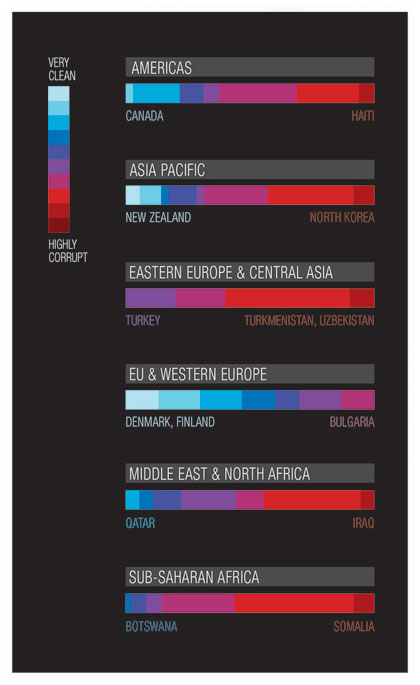 The 2011 Corruption Perceptions Index shows levels of perceived public sector corruption in the countries of Europe and Central Asia cover the gamut of highly corrupt to very clean. Anne Koch, Transparency International’s Regional Director for Europe and Central Asia discusses the results.
The 2011 Corruption Perceptions Index shows levels of perceived public sector corruption in the countries of Europe and Central Asia cover the gamut of highly corrupt to very clean. Anne Koch, Transparency International’s Regional Director for Europe and Central Asia discusses the results.
The 2011 Corruption Perceptions Index provides little cause for celebration in Europe and Central Asia. It shows that yet again existing anti-corruption measures must be effectively implemented and the fight against corruption in all areas of life stepped up. No one can be complacent.
It’s also important to understand that the citizens of those countries that score at the lower end of the index have shown the same concern about public sector corruption as countries that perform strongly, and thus a profound gap between the citizens and the political elite remains.
 The index provides a sobering picture across Europe and Central Asia. We should ask ourselves why in a region that includes some of the most developed democracies of the world, there is a perception of serious corruption in the public sphere. At a time of economic crisis in much of the region with millions of people losing their jobs, it is important to remember that corruption, too, damages the livelihoods and the futures of millions of citizens.
The index provides a sobering picture across Europe and Central Asia. We should ask ourselves why in a region that includes some of the most developed democracies of the world, there is a perception of serious corruption in the public sphere. At a time of economic crisis in much of the region with millions of people losing their jobs, it is important to remember that corruption, too, damages the livelihoods and the futures of millions of citizens.
Basic anti-corruption measures such as effective rules to protect those who blow the whistle on fraud and corruption, limits on the length of corruption trials and more transparency in the financing of political parties are not guaranteed in all parts of the region.
Of course, the region of Europe and Central Asia is vast, and the 50 countries that make up the region vary enormously. So the wide divergence of scores is not surprising.
That said, the former CIS states include some of the index’s worst performers. Countries like Uzbekistan, Turkmenistan, Kyrgyzstan, Ukraine, Tajikistan, Russia, Belarus, Azerbaijan, Armenia and Kazakhstan do not even make the top 100 and all have scores below three.
Russia, for example, is 143rd on the list, despite introducing anti-corruption legislation, recently signing the OECD Anti-Bribery Convention and joining the OECD Working Group on Bribery in International Business Transactions. It seems patently obvious that more action is required.
Clearly there is far more that can be done by the governments of these countries to fight what is perceived as shocking levels of administrative and political corruption, and to increase transparency at all levels of society.
In Western European countries, with some of the most developed parliamentary systems in the world, there is little to celebrate either. Numerous corruption scandals have emerged in these countries recently, some previously undetected for years. The 2011 Corruption Perceptions Index suggests room for improvement across the board.
All over the region, to a greater or lesser degree, corruption tarnishes the public sphere, negatively affecting ordinary people, the political sphere and business alike. Despite a broad consensus on anti-corruption efforts, concerted political will to carry out reform in each and every country is lacking.
As I said, there is little to celebrate.















 Connect with us on Facebook
Connect with us on Facebook Follow us on Twitter
Follow us on Twitter